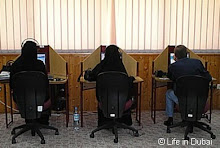It was talking about the advantages of businesses in the same industry setting up shop in the same location, something that's in its early stages in the west.
The article suggests the idea of businesses clustering has become an increasingly important part of regional development and corporate strategies since 1990, with the publication of a book called 'The Competitive Advantage of Nations'.
It's a much older concept in this region, in fact it's always been the standard way of operating.
Before I came to Dubai I was used to businesses wanting an 'exclusivity zone', wanting to be the only business of their type in the location.
I've been a big fan of clustering ever since I first saw the benefits.
For businesses it makes sense because if a number of companies in the same industry set up adjacent to each other it makes commercial sense for their suppliers to set up there too. A win win. They feed off each other and they're conveniently close for doing business with each other.
Examples in the west mentioned in the article are the financial district in London and Silicone Valley. Here we have them everywhere you look - Media City, Internet City, Healthcare City, Academic City, Logistics City. The list goes on and on.
I'm particularly a fan of the retailers clustering and I wish retailers in the west would follow suit.
Back in Sydney - or any other city in the west - the first thing is to remember where a shop selling particular stock is located. Then if they don't have what I'm looking for I have to go some distance, from long to not so long, to find another shop in the same business. If I know where another similar shop is, that is.
Here it's easy, because of clustering. And, by the way, it doesn't only apply to the souks, such as the gold souk, the textile souk, the spice souk, the perfume souk. Clustering is par for the course in the traditional shopping areas and even in the new malls.
It makes shopping so much easier and more convenient. You need a tyre changed? You know there's a cluster in Satwa, for example, where you can find exactly what you want - and in a few metres you can compare several to get the best price.
The same applies to textiles, jewellery, herbs & spices, gold & jewellery, electronics...
Talking of Satwa, one of my favourite shopping areas, there's a gold souk developing there, which is actually like the Deira gold souk used to be before it changed to rows of largely western-style shops selling western-style jewellery to tourists.
Satwa currently has thirty or so tiny shops, almost all displaying the traditional local and Indian designs.

The last couple of times we've had friends visiting they were instantly enthusiastic about clustering, wishing they had the same convenience back home.
Both shopping trips were to Satwa, one for dressmaking material the other for a particular type of gold ring.
Both visitors were mightily impressed that they had such a huge choice in a short easily-walked area. And both found exactly what they were looking for.
Financial Times is here.






2 comments:
And then you can get situations where clustering doesn't work, which is known as a clusterf**k. :.)
Seriously though, clustering has worked for retail throughout the years. The reason why it's not such a hot idea, today, is that the difference (point of distinction/point of difference) between the businesses would be the level of service, and we all know where that's headed.
Yes I agree that clustering has advantages but it is important to to confuse retail clustering with landuse zoning. The later has many negative impacts on urban life, such as increasing dependence on motor vehicles.
Post a Comment